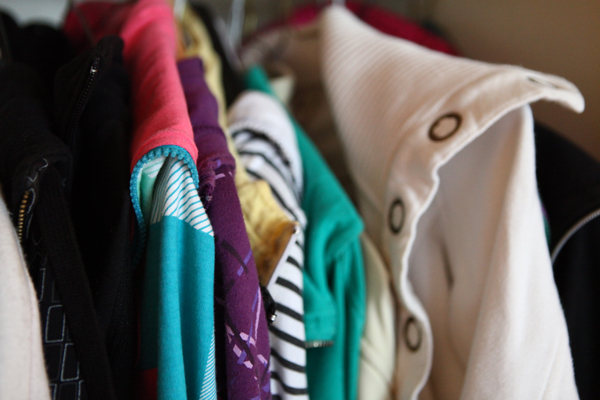I am a 28 year-old female who has grown up in a world where every consumer fantasy I have ever had can be satisfied at a retail outlet. I can buy red patent shoes, floral printed tank tops, head bands, dangly earrings, nail polish in 435 shades, bottled potions that claim to make me look younger, not to mention any home furnishing or electronic device I could ever want.
With the flash of a visa, I can have it all. Of course, then I have to work a few extra hours to pay it all off, but that’s first-world consumerism for you!
The citizens of Canada are now in more debt than we’ve ever been. That’s partially because we live in an expensive country. But it’s mainly because we believe that it is our right to consume, even if we end up spending more than we make.
And up until recently, I was no exception. While I may not have been in debt, I was spending a huge chunk of my paycheque on things I didn’t need. I was buying skincare products, jewelry, shoes, purses and more. I was paying an extreme amount to have my hair coloured with toxic dyes, and brushing pricey makeup onto my face.
I was addicted to consumerism. We use the term “shopaholic” with endearment, but it’s a serious problem, and a financial sink-hole.
Then one day not so long ago I decided to challenge myself. I wanted to see how it would feel to stop constantly buying new things. I decided that if I really needed something, I’d allow myself to get it, but otherwise, I was cut off. I chose to do this because I realized that all of the consumerism that surrounds us is not sustainable, and is terrible for the planet in a number of different ways. But it is a very difficult habit to break, especially when you’re born and raised in a society that encourages you to spend.
Most people don’t understand that when they purchase something they don’t need, they’re taxing the environment. This might sound silly, but it’s true. By purchasing a product, we’re feeding the unsustainable industry of growth. In this country and many, our entire economy is dependent on the concept of growth, which is highly unsustainable because we’re constantly using up resources to feed demand. Everything you see being sold in a store will one day end up in the landfill. And energy and resources will be used to create that same thing all over again. When we buy a new shirt, we are allowing the producer of it to make another one. Energy is poured into the manufacturing of it, and if we never even wear it because we didn’t really need it, the resources it took to produce and ship it are completely wasted.
Some demand is necessary. For instance, I still buy food (organic), toilet paper (100% recycled) and toothpaste (chemical free). But our economy is driven by unnecessary demand. You can see it in every direction you turn. Stores beg you to buy another pair of jeans, a bigger TV, a softer couch, a faster computer. As a matter of fact, retailers have installed the policy of planned obsolescence so that the consumer is pressured to constantly buy the newest model, throwing out the old. We’re buying things we’ve been groomed to believe we can’t live without. But we can!
I own 23 pairs of jeans, why on earth would I need another one?? But somehow retailers had me convinced that I did. I used to pride myself in having such a huge wardrobe, now I find it kind of embarrassing.
When I first cut myself off from unnecessary shopping, life was tough. I realized that I was far too dependent on retail gratification for my own good. Shopping was like a hobby that I was no longer allowing myself to have. I would stand in store windows and pout at perfect mannequins modeling the latest trends. Passing sale racks was probably the most difficult, and many times I’d pause in a moment of weakness before convincing myself to move on.
But it got easier. After about a month of feeling like there was a hole in my life, I started to forget about the constant retail therapy I’d indulged in. Because I’d stopped replacing everything I owned all the time, I grew a new-found appreciation for my possessions.
That was four months ago, and I have not purchased a single thing other than groceries, necessary personal care products, and the odd specialty coffee since then. I hardly even put gasoline in my car anymore because I use my bicycle so much.
Cutting myself off from consumerism has felt strangely uplifting. I realize now how good it feels to be free from the strong-hold retailers had me in. And I’ve managed to save a lot of money in the process!
I’m by no means perfect, and I still have many vices. But I’m no longer tempted by sultry advertising and 50% off signs. I can now confidently walk past most store windows with nothing but a glance and a shrug. I’ve lost the desire and temptation that retailers bank on for business. I’ve become the opposite of who I was a year ago.
I’m not going to start telling people they should do the same, because this was a personal choice. But I will say that I feel happier than ever, and my happiness is no longer based on my belongings. By ceasing my shopping habit, I’ve uncluttered my life a bit, and learned that so many things I think I need, I can live without.
